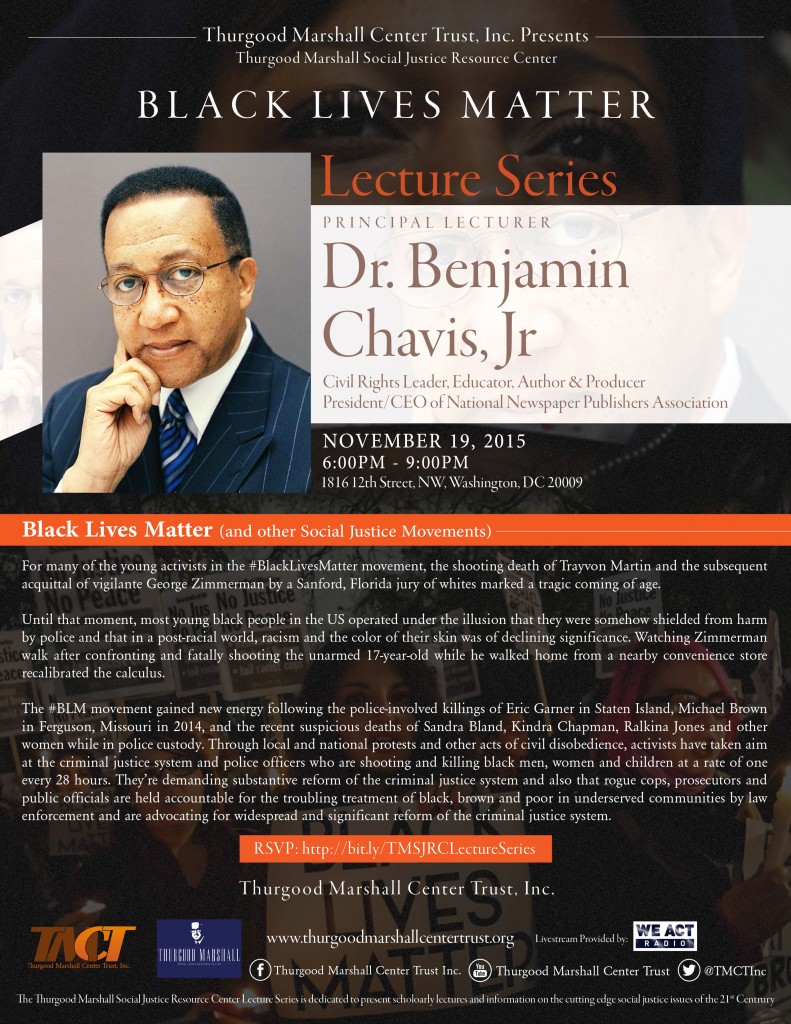-

Black Lives Matter Lecture Series
Black Lives Matter Seminar LiveStream
For many of the young activists in the #BlackLivesMatter movement, the shooting death of Trayvon Martin and the subsequent acquittal of vigilante George Zimmerman by a Sanford, Florida jury of whites marked a tragic coming of age.
Until that moment, most young black people in the US operated under the illusion that they were somehow shielded from harm by police and that in a post-racial world, racism and the color of their skin was of declining significance. Watching Zimmerman walk after confronting and fatally shooting the unarmed 17-year-old while he walked home from a nearby convenience store recalibrated the calculus.
The #BLM movement gained new energy following the police-involved killings of Eric Garner in Staten Island, Michael Brown in Ferguson, Missouri in 2014, and the recent suspicious deaths of Sandra Bland, Kindra Chapman, Ralkina Jones and other women while in police custody. Through local and national protests and other acts of civil disobedience, activists have taken aim at the criminal justice system and police officers who are shooting and killing black men, women and children at a rate of one every 28 hours. They’re demanding substantive reform of the criminal justice system and also that rogue cops, prosecutors and public officials are held accountable for the troubling treatment of black, brown and poor in underserved communities by law enforcement and are advocating for widespread and significant reform of the criminal justice system.
The Thurgood Marshall Center Trust Initiates Social Justice National Lecture Series
By Barrington Salmon
The Thurgood Marshall Center Trust (TMCT) unveiled the first of a series of discussions centered on Civil Rights and social justice in its new Lecture Series on Thursday, Nov. 19, 2015 in Washington, DC. On that night, Principal Lecturer The Rev. Dr. Benjamin F. Chavis, Jr., and Millennial activist Sam P.K. Collins spoke with eloquence and passion about the Black Lives Matter movement, their support for its aims and the need for more blacks to become more engaged in the struggle for self-determination and civil and human rights.
The national lectures will bring together activists – veteran and youthful – authors, representatives of civil society, Civil Rights leaders, high school and university students, professionals and a wide cross-section of other speakers to talk about issues of importance to Blacks in America. The on-the-record lectures are open to the public and will be live-streamed as will also be distributed globally through digitally and social media.
The Thurgood Marshall Social Justice Resource Center’s Lecture Series will present more than a dozen scholarly lectures offering information on a range of cutting-edge social justice issues in the 21st century that will be spread over the next year or more. Among the topics on the agenda are, Civil Rights, Environmental Justice, racial re-segregation of public schools, diversity in the digital world and health disparities in Black America.
At the opening lecture, Center President Thommie Yearwood reiterated to the audience the vital role her organization has and continues to play at a time when cities and states across the country are roiled with police-involved shootings of people of color, racism and discrimination, constant police harassment in black and brown neighborhoods, and those in uniform who kill unarmed men, women and children not being held accountable and are protected by the blue shield.
Chavis, who gained notoriety, global attention and recognition as a member of the Wilmington 10, drew parallels between 19th Century freedom fighter David Walker, abolitionist and humanitarian Harriet Tubman, Civil Rights icon and Supreme Court Justice Thurgood Marshall, the spread of political activism by Millennial activists, and singled out Opal Tometi, Alicia Garza, and Patrisse Cullors. This trio of brave, visionary women is responsible for coining the term “Black Lives Matter” and spearheading the burgeoning Black Lives Matter movement.
For many of the young activists in the Black Lives Matter movement, the shooting death of Trayvon Martin and the subsequent acquittal of vigilante George Zimmerman by a Sanford, Florida jury of Whites marked a tragic coming of age. Until that moment, most Black millennials in the U.S. operated under the illusion that they were somehow beyond the times when they were still susceptible to being harmed by the police or racism.
The police-involved killings of Eric Garner in Staten Island, New York; Michael Brown in Ferguson, Missouri; Freddie Grey in Baltimore, Maryland and the recent deaths of Sandra Bland, Kindra Chapman, Ralkina Jones, and other women while in police custody, has reinvigorated national protests and other acts of civil disobedience. Activists and groups have taken aim at the troubling treatment of the Black, Brown, and poor in underserved communities by law enforcement, and are advocating for widespread and significant reform of the criminal justice system.
“There wasn’t a big debate about the first topic,” said Chavis of the Black Lives Matter movement. “We have to ensure that each generation rises to the occasion and never entertain anything that makes them look like they’re going backwards. We are going forward with Black Lives Matter!”
“It’s not just a hashtag, it’s a progressive movement. I’m not here to judge our young people who are audacious and bodacious in the face of oppression. It’s always been historically necessary to get into the face of oppressors.
Chavis, president and CEO of the National Newspaper Publishers Association, encouraged older blacks to embrace and support Millennial activists.
“We should not be bystanders throwing stones at those seeking to make change,” he said. “Sam’s generation represent the best we’ve ever seen. We need to embrace them, love them.”


